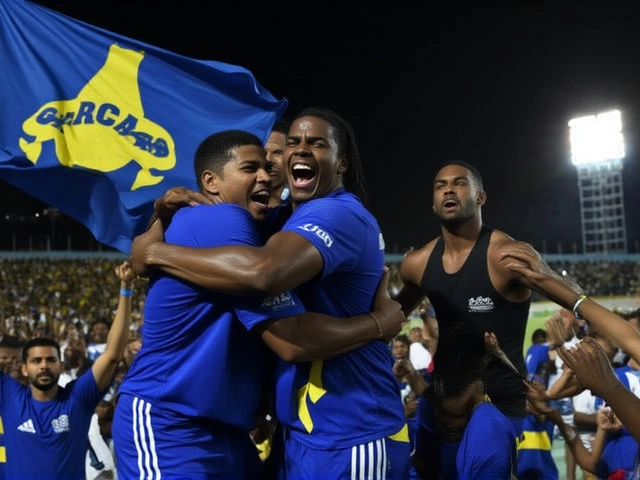
When São Paulo Football Club, the Brazilian football powerhouse founded on January 25, 1930, unveiled a bold environmental, social and governance (ESG) roadmap, the move signaled a seismic shift for the sport’s ethical landscape. The announcement came at BiS SiGMA South America 2025São Paulo, where the club’s senior compliance lead sat down with SiGMA TV to detail the plan. By putting every employee – from the boardroom to the gate‑keepers at Morumbi Stadium – on the ethics front line, São Paulo FC hopes to rewrite how Brazilian clubs think about risk, transparency and community impact.
Historical backdrop: a club steeped in success and scrutiny
São Paulo FC isn’t just another name on the league table. The Tricolor has lifted three FIFA Club World Cups (1992, 1993, 2005), boasts a record 22 national titles, and calls the 67,000‑seat Cícero Pompeu de Toledo Stadium – affectionately known as Morumbi – home. Yet, like many South American institutions, it has wrestled with governance lapses, fan violence and occasional financial missteps. A 2023 Deloitte survey of 30 Latin‑American clubs found that only 22 % had a formal ESG policy, leaving a glaring gap that São Paulo’s leadership is now determined to bridge.
ESG journey: from concept to concrete actions
Leading the charge is Roberto Armelin, Chief ESG, Risk, and Compliance Officer and Legal & Compliance Director at the club. Armelin told SiGMA TV, “ESG is no longer optional; it’s a baseline for any organization that wants legitimacy.” The club is drafting its inaugural Global Reporting Initiative (GRI) report, a transparency tool that will disclose carbon emissions, waste‑reduction targets and social inclusion metrics. Initial goals include cutting stadium electricity use by 15 % by 2027 and increasing female representation in senior roles from 12 % to 25 % within three years.
To operationalise these ambitions, São Paulo FC has rolled out a new workplace‑behaviour policy, an anonymous whistle‑blower platform, and quarterly risk‑assessment workshops for staff at every level. The aim, Armelin explains, is cultural – “we want compliance to be part of daily conversation, not a checklist you file away at year‑end.”
Integrity Tricolor Program (PIT) and strategic partnerships
The centerpiece of the ethics push is the Integrity Tricolor Program, known locally as PIT. Coordinated by the Governance, Risks, and Compliance department, PIT seeks to embed fair‑play principles on and off the pitch. It monitors match‑fixing alerts, educates youth academy players about betting risks, and collaborates with law‑enforcement bodies when irregularities surface.
In a recent press briefing, Júlio Casares, President of São Paulo FC announced a partnership with SIGA LATIN AMERICA, a specialist in sport‑integrity and human‑rights advocacy. Casares declared, “Hosting #SIW2023 and the Integrity Match aligns perfectly with our PIT pillars – integrity, respect, and transparency. Together we will set a benchmark for Brazilian football.” The collaboration will fund joint research, host integrity‑awareness seminars for fans, and sponsor an annual “Clean Game” award.
On Monday, September 4, the club staged an “Integrity Match” at Morumbi – a friendly that paired the senior squad against a mixed‑gender community team. Proceeds funded a scholarship for under‑privileged girls to join the club’s youth program, illustrating how the PIT bridges elite sport and grassroots inclusion.
A cultural shift inside the club walls
Perhaps the most daring aspect of the plan is its demand that every employee, from senior executives to the stadium’s cleaning crew, act as risk stewards. Historically, Brazilian clubs have compartmentalised duties, leaving compliance to a tiny legal team. São Paulo FC is flipping that script by integrating risk‑ownership into performance reviews and linking a portion of bonuses to ESG milestones.
Early feedback is mixed. Long‑time stadium custodian Marcos Silva told the club’s internal newsletter, “At first I thought it was just paperwork, but now I see we talk about waste reduction during lunch breaks. It feels good to be part of something bigger.” Meanwhile, a senior finance director cautioned, “Changing mindset takes time; we need clear metrics so staff don’t feel it’s a vague buzzword.”
To keep momentum, the club has scheduled bi‑annual ESG town‑halls, interactive e‑learning modules, and a monthly “Ethics Spotlight” that celebrates employees who exemplify the new standards.
Impact assessment and future outlook
If the club hits its environmental targets, São Paulo FC could cut annual electricity costs by roughly R$4 million, according to a preliminary financial model. Socially, the increase in female leadership could improve talent retention, a factor linked in a 2022 Harvard Business Review study to a 10‑15 % boost in overall performance. Governance‑wise, the transparent GRI report will likely make the club more attractive to ESG‑focused investors, a segment that pumped over $3 billion into Latin‑American sports assets in 2023.
Looking ahead, Armelin hinted at a pilot renewable‑energy project – installing solar panels on the Morumbi roof by 2026 – and a partnership with local universities to research low‑impact turf maintenance. The club also plans to host the next Sport Integrity Week, expanding the initiative beyond Brazil to neighboring Argentina and Chile.
Key facts
- Founded: January 25, 1930
- Home venue: Morumbi Stadium (capacity ~67,000)
- Lead ESG officer: Roberto Armelin
- President: Júlio Casares
- New partnership: SIGA LATIN AMERICA
- First GRI report due: Q4 2025
Frequently Asked Questions
How will the ESG program affect São Paulo FC’s fans?
Fans will see greener stadium operations – reduced plastic use, better recycling, and lower carbon emissions from match days. The club also plans community‑engagement events during Sport Integrity Week, giving supporters a chance to participate in workshops on fair play and human‑rights awareness.
What does the partnership with SIGA LATIN AMERICA entail?
SIGA will provide expertise on detecting match‑fixing, help draft educational curricula for youth academies, and co‑sponsor research on human‑rights issues in sport. The alliance will also produce an annual Integrity Report that benchmarks the club against global best practices.
Why is a GRI report important for a football club?
The Global Reporting Initiative framework forces the club to disclose measurable data on emissions, labor practices and governance. This transparency builds trust with sponsors, investors and regulators, and positions São Paulo FC as a pioneer among Latin‑American sports organizations.
What challenges does the club expect in changing its culture?
Shifting from a task‑focused mindset to one where every employee evaluates risk requires sustained training, clear KPIs and leadership buy‑in. Early resistance from staff accustomed to siloed roles is expected, but the bonus‑linkage and regular town‑halls are designed to mitigate push‑back.
When will the club’s first ESG milestones be reported?
The inaugural GRI report, slated for the fourth quarter of 2025, will include baseline metrics on energy use, waste management and gender diversity. Subsequent annual updates will track progress against the 2027 carbon‑reduction and 2028 gender‑parity targets.


